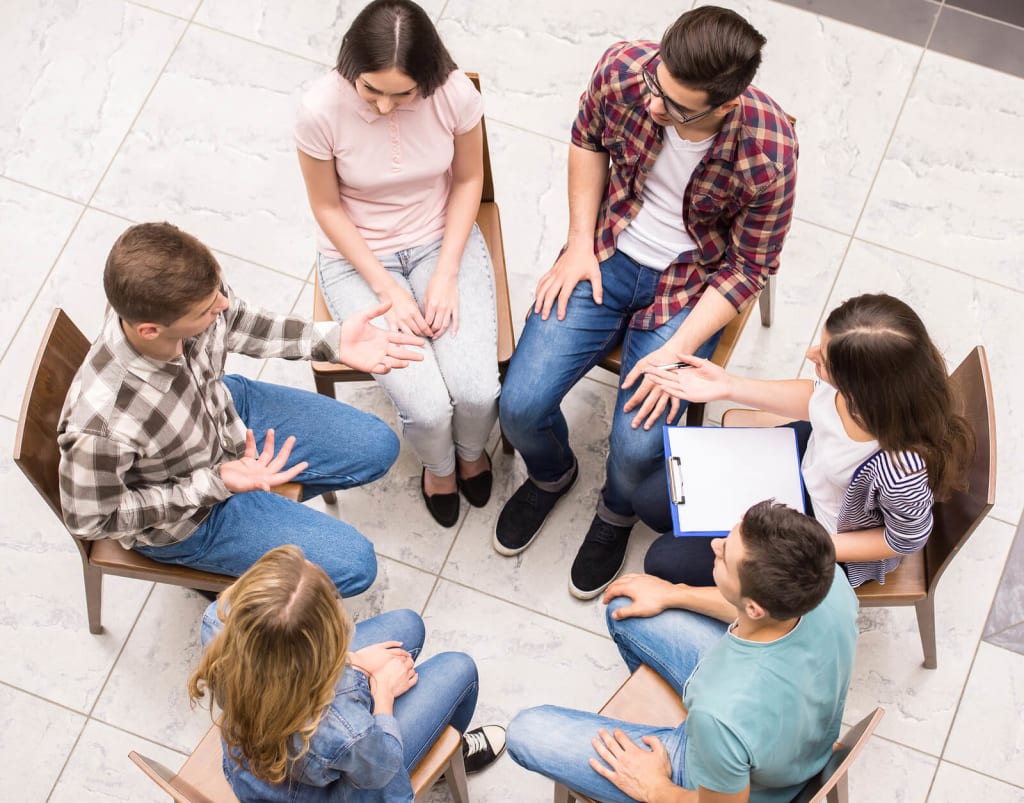A friend in need is a friend indeed!!
Group therapy session

Have you always wondered you need a person to open up to, a person who don't know about you. Well this article is the best place for that, why don't we use the comment box like a group therapy session, where everyone can open up about their feelings and problems without showing their true identities. I will be the first one and open up about my insecurities and feelings in the comment box. We will turn this article into a group therapy session!
Group therapy sessions and it's uses
Group therapy is a form of psychotherapy that involves a therapist working with a group of individuals who are experiencing similar issues or challenges. This type of therapy is typically led by a mental health professional, such as a psychologist or a licensed therapist, and it can be an effective way to address a wide range of mental health concerns.
There are many different types of group therapy, each with its own unique benefits and challenges. Some common types of group therapy include support groups, psychoeducational groups, process groups, and cognitive-behavioral groups.
Support groups are typically used to help individuals cope with a specific issue, such as a chronic illness or addiction. These groups provide a safe space for individuals to share their experiences, receive emotional support, and learn coping strategies from others who are going through similar challenges.
Psychoeducational groups are designed to teach individuals about specific mental health issues, such as anxiety or depression, and provide them with practical tools and strategies to manage their symptoms. These groups often involve a structured curriculum, and they may include lectures, discussions, and activities to help participants learn and practice new skills.
Process groups are focused on exploring interpersonal dynamics and relationships within the group. Participants in these groups share their thoughts and feelings with each other, and the therapist helps to facilitate a deeper understanding of group dynamics and how they affect individual behavior.
Cognitive-behavioral groups focus on identifying and changing negative thought patterns and behaviors that contribute to mental health problems. Participants in these groups learn to challenge their negative thoughts, practice coping skills, and set goals for positive change.
One of the primary benefits of group therapy is the sense of community and support that it provides. Participants in group therapy often feel less alone and more understood, as they are able to share their experiences with others who are going through similar challenges. Additionally, group therapy can be more cost-effective than individual therapy, as the therapist's time is shared among multiple participants.
Group therapy can be used to address a wide range of mental health concerns, including depression, anxiety, PTSD, substance abuse, and eating disorders. It is often used as a complement to individual therapy, and it can be an effective way to build skills, gain insights, and receive emotional support from others who are on a similar journey.
The experience of a group therapy session can vary depending on the specific type of therapy and the goals of the group, but here is an example of what a first session might look like:
Introductions: The therapist will start by introducing themselves and explaining the purpose and format of the group therapy session. They may also ask each participant to introduce themselves and share a little bit about why they are there.
Group Guidelines: The therapist may establish group guidelines, such as confidentiality, mutual respect, and active participation. These guidelines help create a safe and supportive environment for everyone in the group.
Icebreakers: To help break the ice and get everyone comfortable, the therapist may lead a brief activity or exercise. This could be anything from a group discussion prompt to a mindfulness exercise.
Discussion: The majority of the group therapy session will likely involve group discussion. The therapist may facilitate the conversation, but the goal is for everyone in the group to share their thoughts, feelings, and experiences related to the group's topic or goals. The therapist may also provide feedback or ask questions to encourage deeper exploration of the topic.
Closing: The therapist will wrap up the session by summarizing what was discussed, thanking everyone for participating, and previewing what will be covered in the next session.
It's common for participants to feel nervous or unsure during their first group therapy session, but it's important to remember that everyone else in the group is likely feeling the same way. Group therapy can be a powerful and rewarding experience, as it provides a sense of community and support that can be hard to find elsewhere.
About the Creator
Rohith Pailey
For some legit articles, subscribe to my page.. It will be worth it I assure ya!





Comments (2)
Well i would like to say that I am really shy and would like to open up to others.. I don't how to talk to girls and I don't have enough self confidence..
I would like to talk about my insecurities.. I am not able to express my feelings to others, I feel like losing control over myself. I am so self-absorbed that I don't care about others.